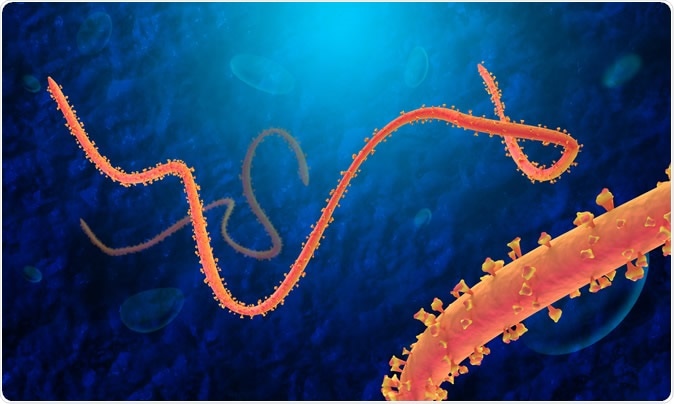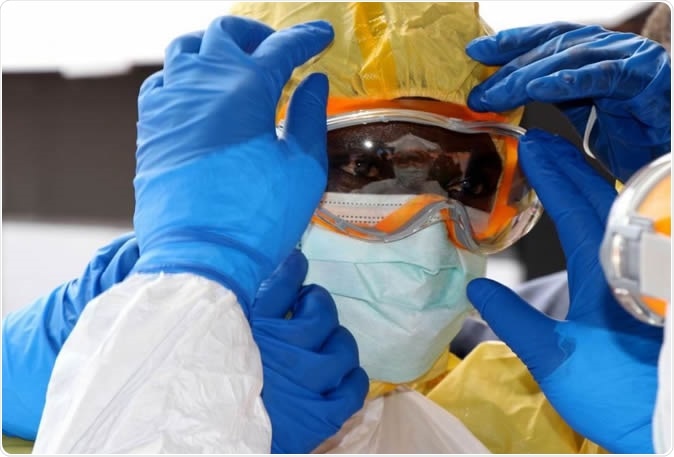Ebola, the deadly viral infection, is spreading in Congo and the World Health Organization (WHO) has announced it as an international health emergency. Speaking in front of reporters, WHO Director-General Tedros Adhanom Ghebreyesus gave updates on the situation in the Central African country.
Since the deadly outbreak is now considered a Public Health Emergency of International Concern (PHEIC), he said it’s time to redouble efforts to “end the outbreak and build a health system”. However, he reiterated the outbreak still does not pose any threat globally.
The declaration followed a meeting of the International Health Regulations Emergency Committee for Ebola virus disease (EVD) in the Democratic Republic of the Congo (DRC). A declaration of a global health emergency will bring greater international attention and aid. But, along with these, it may also raise the risk of governments opting to close borders.

Ebola Virus. Illustration Credit: Festa / Shutterstock
Families are dying
“This is about mothers, fathers, and children - too often entire families are stricken. At the heart of this are communities and individual tragedies. The PHEIC should not be used to stigmatize or penalize the very people who are most in need of our help,” Dr. Tedros said.
During the meeting, the committee unveiled recent developments in the outbreak, including the first confirmed case in Goma, home to almost 2 million people and a gateway to the rest of the country and the world.
The new case triggered calls for more international support amidst the rapid surge in transmission rates. However, local officials appealed for calm.

The outbreak of Ebola virus disease (EVD) in North Kivu and Ituri provinces, Democratic Republic of the Congo (DRC) continued this past week with an overall similar transmission intensity compared to recent weeks.
No closing of borders and trade
Though the committee has declared the situation as such, it does not recommend closing the borders or even imposing restrictions on travel and travel to the country. It has expressed disappointment about funding delays, constraining the response to combat the outbreak.
Furthermore, the committee urges the need to protect the livelihood of constituents affected by the outbreak. They recommend keeping transport routes and borders open, to prevent the negative impact of the outbreak on the economy.
“It is important that the world follows these recommendations. It is also crucial that states do not use the PHEIC as an excuse to impose trade or travel restrictions, which would have a negative impact on the response and on the lives and livelihoods of people in the region,” Prof. Robert Steffen, chair of the Emergency Committee, said in a statement.
Ebola cases on the rise
The committee reviewed the current analysis before landing a decision.
“There are increased numbers of cases in Butembo and Mabalako; the epicenter has moved from Mabalako to Beni, and there is one imported case in Goma,” the committee said.
“Factors affecting the outbreak include population movement in highly densely populated areas; weak infection and prevention control practices in many health facilities; complex political environment; continued reluctance in the community; and the ongoing unstable security situation, which led to the recent murders of two community health workers,” it added.
The Ebola virus disease outbreak started on August 1, 2018, when the Ministry of Health of the Democratic Republic of the Congo. At present, the total list of cases is 2,489, of these, 2,385 are confirmed cases. Approximately two-thirds of them have died and about 12 new cases are being reported every day.
What is Ebola virus disease?
The Ebola virus disease (EVD), formerly known as Ebola hemorrhagic fever, is a serious and potentially fatal disease caused by a virus, which is transmitted to humans by wild animals. The virus can rapidly spread across populations through human-to-human transmission.
The illness is deadly and the case fatality rate of EVD is about 50 percent. Ebola virus was first discovered in 1976 near the Ebola River, which is now called the Democratic Republic of Congo. Since then, there were many outbreaks in various African countries.
The illness could turn fatal if left untreated. Early supportive care including symptomatic treatment and rehydration helps improve prognosis. The signs and symptoms of the illness occur after 2 to 21 days of exposure to the virus. These include fatigue, fever, muscle pain, sore throat, and headache. After, the patient may experience diarrhea, vomiting, rashes, and symptoms of impaired liver and renal function.
In worse cases, the patient may experience both internal and external bleeding, like blood in stools, nose bleeding, or blood oozing from the gums.
Sources:
World Health Organization. (2019). Statement on the meeting of the International Health Regulations (2005) Emergency Committee for Ebola virus disease in the Democratic Republic of the Congo on 17 July 2019. https://www.who.int/
World Health Organization. (2019). Ebola outbreak in the Democratic Republic of the Congo declared a Public Health Emergency of International Concern. https://www.who.int/news-room/detail/17-07-2019-ebola-outbreak-in-the-democratic-republic-of-the-congo-declared-a-public-health-emergency-of-international-concern